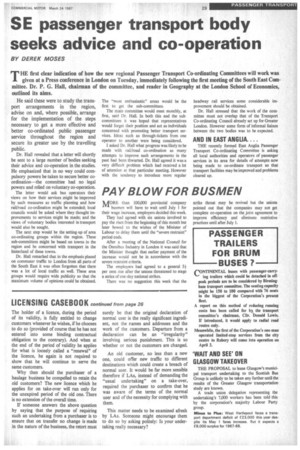SE passenger transport body seeks advice and co-operation
Page 31

If you've noticed an error in this article please click here to report it so we can fix it.
BY DEREK MOSES THE first clear indication of how the new regional Passenger Transport Co-ordinating Committees will work was given at a Press conference in London on Tuesday, immediately following the first meeting of the South East Committee. Dr. P. G. Hall, chairman of the committee, and reader in Geography at the London School of Economics, outlined its aims.
He said these were to study the transport arrangements in the region, advise on and, where possible, arrange for the implementation of the steps necessary to get a more effective and better co-ordinated public passenger service throughout the region and secure its greater use by the travelling
Dr. Hall revealed that a letter will shortly be sent to a large number of bodies seeking their advice and co-operation in the studies. He emphasized that in no way could compulsory powers be taken to secure better coordination—the committee had no legal powers and relied on voluntary co-operation.
The letter would ask bus operators their views on bow their services might be improved by such measures as traffic planning and how rail/road co-ordination might be extended; local councils would be asked where they thought improvements to services might be made; and the views of voluntary bodies interested in transport would also be sought.
The next step would be the setting-up of area co-ordinating groups within the region. These sub-committees might be based on towns in the region and be concerned with transport in the hinterland of these towns.
Dr. Hall remarked that in the emphasis placed on commuter traffic to London from all parts of the South East it was often forgotten that there was a lot of local traffic as well. These area groups would require wide publicity so that the maximum volume of opinions could be obtained. The "most enthusiastic" areas would be the first to get the sub-committees.
The main committee would meet monthly, at first, said Dr. Hall. In both this and the subcommittees it was hoped that representatives would forget their position and act as individuals concerned with promoting better transport services. Ideas such as through-tickets from one operator to another were being considered.
I asked Dr. Hall what progress was likely to be made with rail/road co-ordination as many attempts to improve such arrangements in the past had been thwarted. Dr. Hall agreed it was a very difficult problem which had received a lot of attention at that particular meeting. However with the tendency to introduce more regular headway rail services some considerable improvement should be obtained.
Dr. Hall stressed that the work of the committee must not overlap that of the Transport Co-ordinating Council already set up for Greater London. However some form of informal liaison between the two bodies was to be expected_
AND IN EAST ANGLIA....
THE recently formed East Anglia Passenger Transport Co-ordinating Committee is asking all local authorities and operators of passenger services in its area for details of attempts now being made to co-ordinate transport so that transport facilities may be improved and problems cleared up.








































































































